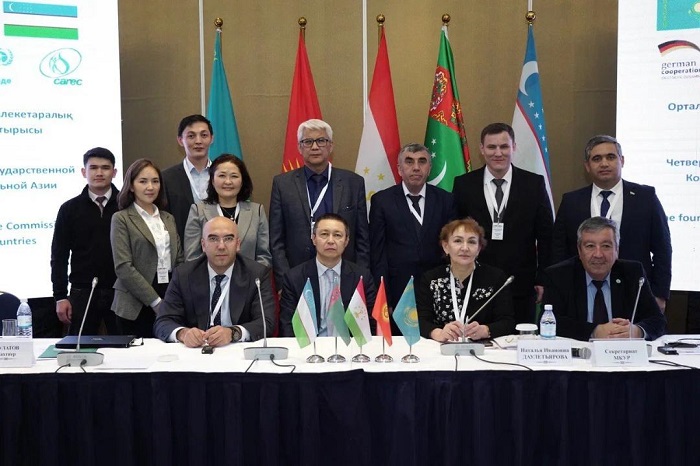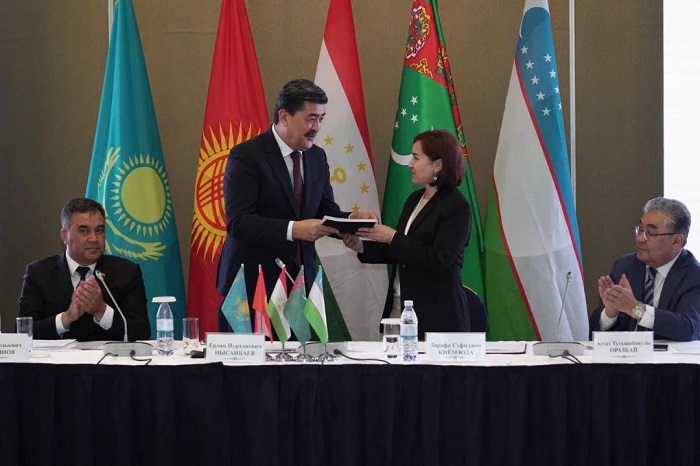On 28 March 2024, Kazakhstan hosted a meeting of the Interstate Commission on Sustainable Development (ICSD) in Astana, according to the Kazakh Ministry of Ecology and Natural Resources.
Representatives from the environmental ministries of Central Asian countries (Kazakhstan, Tajikistan, Turkmenistan, Uzbekistan) attended the meeting. Additionally, representatives from the Regional Environmental Center for Central Asia (RECCA), UNEP, UNECE, and the German Society for International Cooperation (GIZ) were present.
The agenda included a report on Kazakhstan’s achievements during its ICSD presidency (2022-2024), progress on implementing decisions from the previous ICSD meeting, and other regional environmental cooperation issues. The meeting also saw the official handover of the ICSD chairmanship from Kazakhstan to Tajikistan. Kazakhstan held the position from 2022 to 2024, and Tajikistan will chair the commission until 2026.
As the Minister of Ecology and Natural Resources of Kazakhstan Yerlan Nysanbayev noted during the meeting, the issue of the impact of climate change on water resources in Central Asia is particularly acute. Water resources in the region determine various aspects of national and regional security, they are used by all sectors of the region’s economy.
“The priority in the work of the ICSD is increased attention to sustainable development and integrated water resources management to achieve socio-economic and environmental goals, the implementation of the Regional Environmental Protection Program for Sustainable Development of Central Asia, as well as the expansion of cooperation and partnership at all levels to promote the implementation of internationally agreed goals and objectives related to water resources, including those envisaged in the 2030 Agenda for Sustainable Development,” he said.
Askhat Orazbai, Chairman of the Executive Committee of the International Fund for Saving the Aral Sea (IFAS), commented on the significance of the meeting.
“Today, Kazakhstan is passing the torch of the ICSD chairmanship to our fellow Central Asian nation, Tajikistan,” Orazbai said. “This handover coincides with Kazakhstan assuming the IFAS chairmanship from Tajikistan just three months ago. It underscores the interconnectedness of our region and the close collaboration between these critical organizations.”
Zarafo Kiyomzoda, First Deputy Chairman of Tajikistan’s Committee on Environmental Protection, highlighted the ICSD meeting’s significance in demonstrating the collective commitment of intergovernmental and international organizations to addressing environmental challenges in the region. Kiyomzoda commended the ICSD’s progress in recent years, particularly in strengthening the institutional and legal framework to identify priority areas for regional cooperation.
According to Begench Miminov, Deputy Minister of Environmental Protection of Turkmenistan, over the past years, it was IFAS and ICSD that played an important role in building dialogue and cooperation to solve economic and socio-economic problems caused by the drying up of the Aral Sea.
“The Aral problem has gone far beyond the borders of our region and has become a truly global problem that requires the same global response,” Begench Miminov stressed.
He noted that Turkmenistan stands for the support and implementation of specific initiatives of the IFAS founding countries aimed at enhancing regional cooperation and the formation of systemic mechanisms for cooperation in the field of environmental protection and sustainable development in the regions of Central Asia.
“Our common goal is to create a harmonious, sustainable and long-term system of cooperation based on ensuring the interests of the countries of our region, the well-being of the peoples living there, their health, development and progress,” Miminov said.
Utkir Zhumanov, head of the secretariat at Uzbekistan’s Ministry of Ecology, Environmental Protection and Climate Change, emphasized Uzbekistan’s focus on achieving sustainable development in harmony with nature. He identified green growth, renewable energy development, eco-friendly transportation, and expanding green spaces as key national priorities.
Zhumanov highlighted the large-scale tree and plant restoration efforts underway on the exposed Aral Seabed, covering over two million hectares. This initiative combats dust and salt storms plaguing the region.
The head of the Sub-Regional Office of the United Nations Environment Programme (UNEP) for Central Asia, Aidai Kurmanova, noted the interest of UNEP in cooperation with the countries of the Central Asian region and the intention to implement decisions taken at the global level of the organization through concrete practical actions in addition to what is already being implemented in the region today.
Sarangoo Radnaaragcha, UNECE Regional Environmental Advisor, reaffirmed the organization’s ongoing commitment to supporting Central Asian nations in strengthening their environmental and water resource management capabilities.
“Our support focuses on promoting sustainable development and tackling pressing issues like climate change, water scarcity, and environmental degradation,” Radnaaragcha explained.
Marat Asanaliev, Deputy Director of GIZ’s regional program “Integrated Land Use taking into account Climate Change in Central Asia,” presented the “Green Central Asia” initiative. This initiative includes 10 projects, both national and regional, addressing crucial areas such as water resources management, green economy development, climate change adaptation, land use management, and biodiversity conservation.
All participants of the meeting expressed gratitude to UNEP, GIZ, OSCE, EU and other international organizations for their contribution and assistance in tackling environmental issues.
The Interstate Commission on Sustainable Development was established in accordance with Article 2 of the Agreement on Joint Actions to Solve the Problems of the Aral Sea and the Aral Sea region, Environmental Rehabilitation and Socio-economic Development of the Aral Region, signed by the Heads of State of Central Asia in March 1993.
The main goal of the ICSD is to coordinate and manage regional cooperation in the field of environment and sustainable development of Central Asian countries.///nCa, 1 April 2024 (based on materials from RECCA and the Ministry for Ecology and Natural Resources of Kazakhstan)

